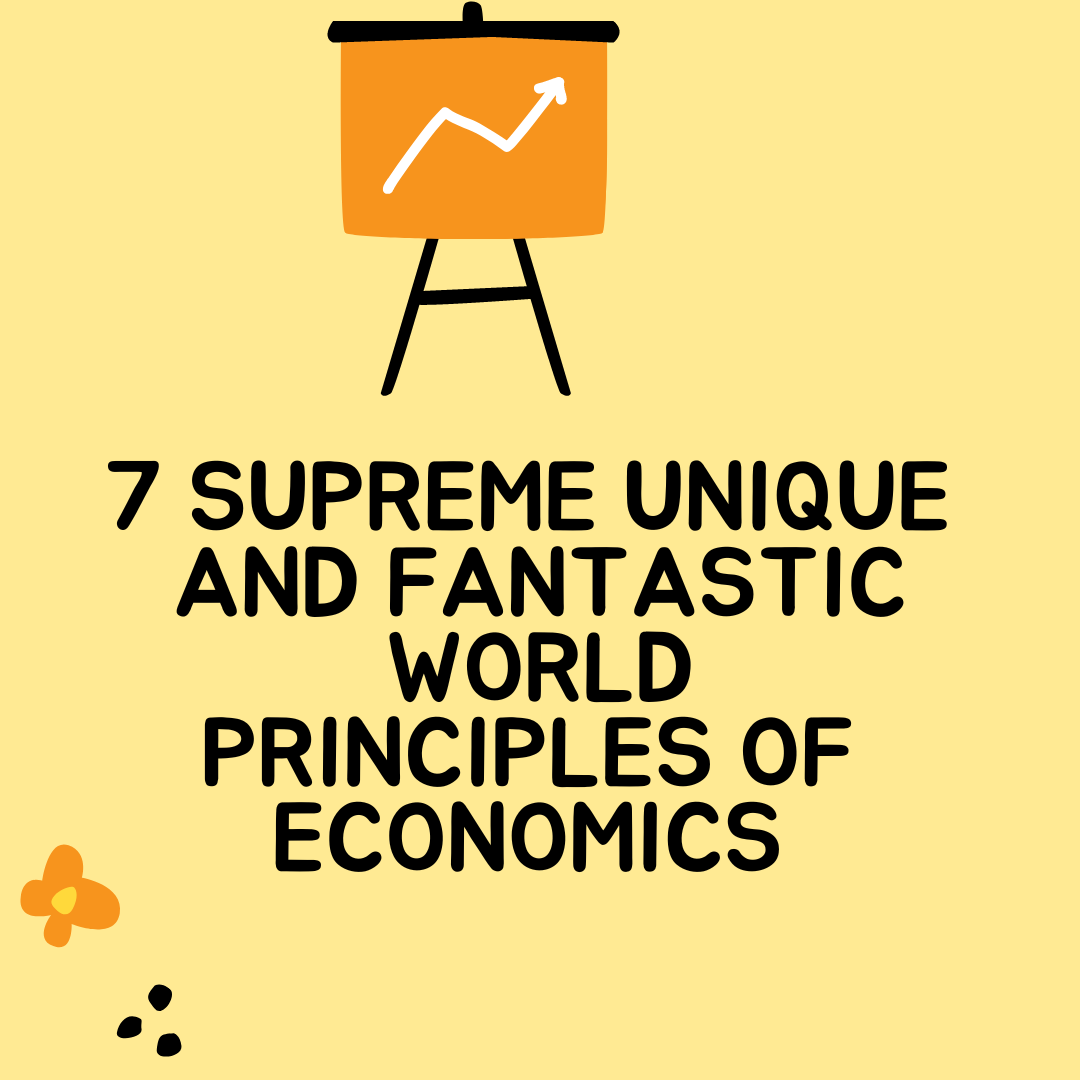7 Supreme unique and fantastic world Principles of Economics
Hi everybody, My name is “Ajay Birajdar” and I’m here to welcome you to
economics. We’re going to start off with a pretty big discussion, so get ready to take
some notes. 7 Supreme unique and fantastic world Principles of Economics
We’re going to start off with some warm-up questions. Here are some advanced
questions to check your knowledge:
What have you heard about economics?
2. Based on your real-world knowledge and past courses you’ve taken, what’s an
economy and how does it work.
3. What do you want to learn about economics and the economy?
Go ahead and be very patient, to read this article and answer
these questions for me.
Now let’s start exploring these concepts
First, what is economics?
Economics is All about choices. All the resources in the world are much limited.
How do people use these limited resources to meet their limitless needs and wants?
That is the economist’s study
Generally, there are two different types of economics:
Microeconomics, and
Macroeconomics.
So what is the difference?
Microeconomics studies small individual changes. Such as how an individual family
or a business would make decisions. Whereas, macroeconomics study is the study of
the entire economy and how it functions. It’s much on a bigger scale.
We usually think of resources as something that we can Tangible hold. But “Time”
is one of our most valuable yet limited (Scarce) resources.
So, I want you to think about how you spend two days of school, one day when
you’re in class and one day when you’re at home. And map out how you spend your
days?
Then think about how happy you are with this resource. After you have finished
that activity. Let’s continue by asking ourselves, what is the economy?
In a given area (usually a nation or country) an economy describes the production.
Distribution and consumption of limited resources.
Now we are going to get into the foundation. On which we will build all our
economic knowledge for the entire discussion.
The seven principles of economics
1. Scarcity forces tradeoffs:
The first principle of economic scarcity forces tradeoffs. Scarcity means that all
resources are much limited, which I discussed earlier. And trade-offs are what you
give up every time you make a choice.
So if there’s a shortage of toilet paper for example. You may be willing to pay extra
than what you in general would for that resource.
2. Cost vs. Benefit:
The second principle of economics is the concept of cost vs. benefit. Costs refer to
what you spend when you make a choice. This could be time, money, resources, or
anything that you give up. And benefits are what you gain when you make that
choice.
So, it could be the time that you spend researching the phone and the money that
you spend to buy it. They are the costs, and the benefit would be a brand-new
phone.
What is the cost vs. benefits principle? This means when people make a choice. It’s
always thought (Conscious or Unconscious) that the benefits outweigh the costs.
What is a cost-benefit analysis? When you’re to list out the costs and benefits of a
decision and then make a choice. So it’s essential, like making a big pro-con list for
your decision.
3. Thinking at the margin:
The next principle of the economics you need to know is thinking at the margin. Some
terms to know a margin is an outside edge or border.
Marginal benefit is what you gain by adding one unit of something. (For example,
Time) and marginal cost is what you lose by adding one unit of something.
So let’s talk about that in practice. Thinking at the margin means considering the
marginal cost. And benefit involved in making a decision. For example, if you Work
Extra hard one day, you are losing that an hour during the day. And you’re losing
all that time and losing the effort that you put into that work. But it also means that
you get an easier day the next day.
Take your time after work into consideration. You have a limited number of hours
before you need to go to sleep, right. So how do you maximize or think at the margin
to make it through that time that you have counted?
4. Incentives matter
the next principle of economics we’re going to cover is that incentives matter. An
incentive is something that motivates a person to act a certain way. For example,
your parents or guardians may pay you five thousand per “A” that you receive in
the semester. And that would incentivize you to work harder in classes to get that
incentive.
Why do incentives matter? Because they motivate our behavior, whether we realize
it or not. In general, people respond to incentives in predictable ways. For, example,
a company might come out with a product and say that it’s a limited edition. And
that limited edition label will encourage buyers to make a quick decision on whether
to buy it.
5. Trades make people better off
The next economic principle we’ll cover is that trades make people better off. So
what is a trade? It’s the voluntary exchange of goods. For example, a trade of 10
rupees for a pencil.
How do trades make people better off? We trade because it’s inefficient to make
everything you need. For example, if you specialize in making pencil pouches.
Someone else specializes in making pencils. You trade each other for what you need.
Everyone is better off.
Trade allows certain people or countries to specialize and then trade for what they
need. Something to trade for what they want or need/want.
When you get a job. You are likely going to specialize in helping create a good or
service. And then trade (Most of the time money) for what you can’t produce
yourself.
6. Markets ease trades
The next principle that you need to know is that markets ease trades. A market is a
space where buyers and sellers trade (do business). This can be physical, online,
formal, or informal.
How do markets ease trade? In a marketplace with limited. With government
intervention, buyers and sellers are free to conduct trades.
In this type of marketplace, the buying and selling of goods and services are
efficient. Because you may have seven dozen apples, but you may want eggs. And
someone else may have seven dozen eggs, and they may need some apples.
Adam Smith, the father of economics, described the efficiency of the free markets.
Also, describe the “invisible hand” guiding buyers and sellers.
7. Future consequences matter:
Our final principle is that future consequences matter. When we make decisions, the
effects or consequences are far-reaching. A choice we make today may impact us or
other people in the long run.
Thank you






